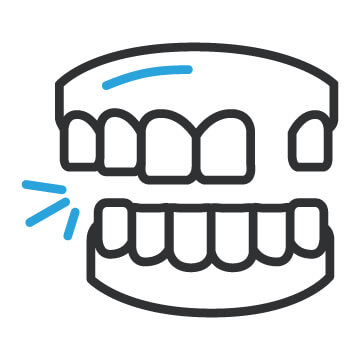TMJ | TMD
TMJ | TMD
Mastering Your Jaw's Well-being
TMJ, short for temporomandibular joint, serves as the crucial link connecting your lower jaw to the temporal bone in your skull. This intricate joint plays a pivotal role in controlling essential jaw functions like chewing. However, should discomfort arise in your chewing muscles or the joint itself, the culprit could well be a temporomandibular disorder (TMD). TMD can manifest due to teeth grinding, habitual clenching of jaw muscles, or even stress. Recognizable symptoms include a clicking or popping sensation when opening your mouth, instances of your jaw getting stuck open or shut, pain during mouth movement, teeth grinding, headaches, ear pain, and difficulties while chewing.
TMJ | TMD
Symptoms
Some symptoms of TMD include; clicking or popping sounds when opening your mouth, your jaw becoming stuck shut or open, pain when closing or opening your mouth, teeth grinding, ear pain or headaches, and trouble chewing.
Of particular concern is teeth grinding, or bruxism, a disconcerting habit that can lead to additional dental problems if left untreated. Prolonged grinding erodes tooth enamel, potentially exposing the underlying dentin, which is considerably softer and prone to decay. Sensitivity to hot or cold substances may also arise from bruxism-related enamel erosion. If TMD is suspected, prompt consultation with a dentist is crucial. Relief can often be achieved temporarily through hot or cold compresses and pain relievers. A night guard proves effective against teeth grinding during sleep, eventually working toward a more lasting solution. Adjusting everyday behaviors can also alleviate symptoms, although severe cases may necessitate TMD surgery.
TMJ | TMD
Patients Affected
TMD doesn’t discriminate and impacts approximately 10 million individuals, often causing jaw popping, neck and back discomfort, and even migraine headaches. Each case presents a unique set of challenges that warrant specialist attention—toughing it out is not advisable. TMD, or temporomandibular joint disorder, aptly defines the most common instances of jaw pain and inflammation. Interestingly, the terms TMD and TMJ (temporomandibular joint) are used interchangeably to describe this condition. Treatment options range from over-the-counter pain medications and muscle relaxants for severe discomfort to employing mouth guards to curb tooth grinding. In extreme scenarios, surgical intervention might be necessary to restore optimal TMJ function and alleviate associated issues.
TMJ | TMD
Related Procedures
Occlusal Adjustment
An occlusal adjustment can correct a misaligned bite that is caused by loose, shifting, crowded or missing teeth. Once completed, an…
Mouth Guards
A mouth guard can help prevent structural damage to your jaw as well as your teeth. It can also reduce the chance of lacerations to...
